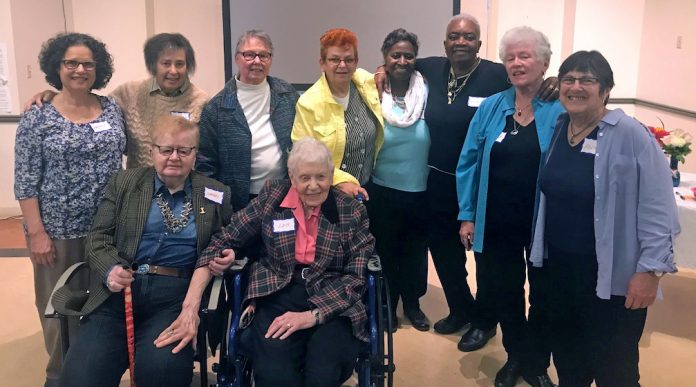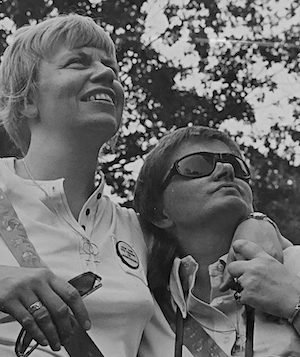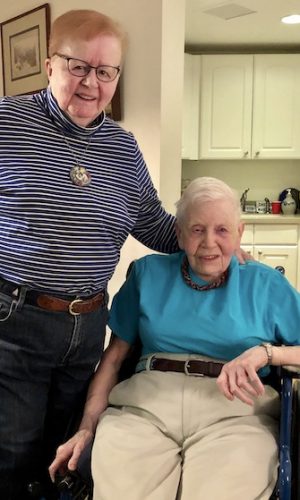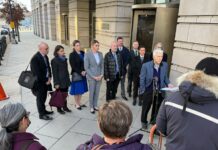
[This Senior Spirit column appears in the January/February 2020 issue of Boston Spirit magazine. Subscribe for free today.]
It is too easy to sit back and believe that history is written by the contributions of our forefathers because that’s what we were told in school. Look behind every movement, every significant moment in history and you will see strong women fighting, organizing and educating. The same is true in the LGBTQ community: the women have played a central role in the fight for the rights we all enjoy today.
On October 27, 2019, over 100 women gathered at the Brookline Senior Center for a special event honoring the Lesbian Founders of Lesbian Organizations in Boston. The event was organized by RALLY, a social organization for lesbian, bisexual and transgender women 55+. Event cochairs Suzanne Laurelle and Sue Reamer, felt an event like this was needed to bring together women from all the different organizations, and, Laurelle added, “Something like this had never been done before, anywhere, and on top of that, there are women who have never heard of some of the early lesbian groups. We felt it was our role to pass this history down to the younger generations.”
The event celebrated and honored 12 women who represented 7 different lesbian organizations. These distinguished pathfinders included Lois Johnson and Sheri Barden of Boston’s Daughters of Bilitis, Sue Katz from the Lesbian Liberation Movement, the late Toni Schiff and Araya Fast for OLE (Older Lesbian Energy); Candy Feldt and Doreen Michaels for Ova 4D (Lesbians over 40) Jan Taylor for RALLY, Sarah Pearlman and Alice Fisher for OLOC (Old Lesbians Organizing for Change) and Shirley Royster and Gloria Charles for Flashback Sunday (LGBT Elders of Color).
There were so many stories shared during the event that stretched across the decades. One of the many highlights included the tributes to Johnson and Barden, who ran the Boston chapter of Daughters of Bilitis (DOB) for 20 years. DOB was the first lesbian political rights organization in America. It was started in San Francisco in 1955 by the legendary Del Martin and Phyllis Lyon. The organization’s name came from the fictional lesbian character Bilitis who lived on the island Lesbos along with Sappho, from the 1894 French work “Songs of Bilitis” by Pierre Louys.

In 1969 Johnson and Barden were approached by activist Jan Chase to start a chapter of DOB in Boston. It was a risk in those days to identify as a lesbian and a greater danger to start a political group to organize lesbians. Even that first meeting was held in a secret location in a cabin in the woods. At the time Johnson had a job as a producer for children’s television on WBGH and she couldn’t risk losing her job, so they sadly declined the offer.
Later that year the Stonewall Riots happened and in the following year Johnson and Barden watched the first gay march in New York City on television from their home. “We cried and cried watching that and said we have to do something, we can’t sit on the sidelines any longer.” In that moment they made a commitment to not worry about the risks and to get out there and join in on the fight for gay rights. The next year, 1971, Barden and Johnson attended Boston’s first gay rights march and joined the recently formed Boston chapter of DOB. By 1975, Johnson was elected president in a landslide and would hold that title until the group closed its doors.
Although the original mission of DOB was very radical and political, Johnson and Barden saw a greater need to create a community of gay women. They struggled with the word “lesbian” back then because it was so closely associated with criminal behavior and deviance. Barden, who had known what it was like to be in a community of gay women during her years in the military, had been so disappointed when she got out and moved to Boston. “I kept wondering ‘where are all the women? How do we find them?’” As leaders of DOB, the couple started putting ads in the Gay Community News and the Boston Phoenix inviting gay women to attend rap sessions at the Old Cambridge Baptist Church.

One of the critical roles Daughters of Bilitis played in the Boston community in the ’70s and ’80s was to provide a place for women to meet and support each other through those difficult times. The “rap groups,” as they were called, gained in popularity and soon, in addition to the general raps, they had special raps including ones for women over 35, women with children, married women, etc. The groups were all led by rap leaders and DOB provided the training for the leaders. Barden said, “Those raps were so important; these women didn’t have anyone to turn to and sometimes their stories were so painful.” Johnson adds, “One woman came to DOB and shared that her children were taken away from her when her husband learned she was a lesbian. Then at the trial her own mother testified against her saying she was an unfit mother.”
In 1995 Johnson called for a vote to have DOB close its doors. “It was the ’90s and you didn’t need to hide anymore like the earlier days, and just about every school and college had a gay group. We felt our work was done.” To this day both Barden and Johnson still have women who come up to them saying that DOB saved their lives.
Nearly 50 years have passed since Barden and Johnson were gathering women in a church meeting room in Cambridge, but in the last 15 years a new need surfaced in the LGBTQ community. Jan Taylor believed “older lesbians were facing a real problem, they were sliding into social isolation. The bars were gone and we were too old for them anyway. We needed something to bring older lesbians together for social connection and support as we age.” Just like the original meeting in the cabin in the woods, Taylor called together a collection of women and said, “We need a group for LBT women over 55. Let’s do this together.” That night in 2012 in a living room in Lexington, RALLY was born. This was the reason behind all the other older women’s groups that were honored. They each realized that something had to be done to bring the community back together. That organizing spirit never quits for these leaders.
As each of us in the LGBTQ community begin to age, we are all asked to consider what do we want to pass down to the younger generations that will be remembered after we are gone. We are all so fortunate to Rally organizers, Suzanne Laurelle, Sue Reamer and Jan Taylor for putting on this important event to remind us to never forget the contributions of these brave leaders who shaped the LGBTQ movement 50 years ago and continue to shape it today. We are forever grateful.
Bob Linscott is assistant director of the LGBT Aging Project at The Fenway Institute
Not a subscriber? Sign up today for a free subscription to Boston Spirit magazine, New England’s premier LGBT magazine. We will send you a copy of Boston Spirit 6 times per year and we never sell/rent our subscriber information. Click HERE to sign up!








